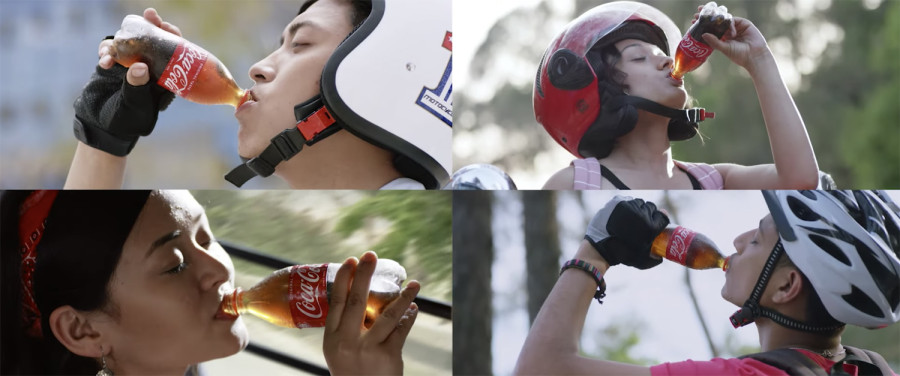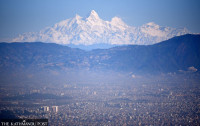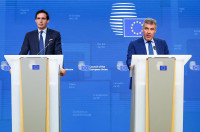Climate & Environment
Coca-Cola wanted consumers to be ‘best friend’ with its new product. Not everyone is amused
Consumers and waste management companies say smaller sized bottles will add to plastic pollution in Nepal. Coke defends its packaging, calling them recyclable.
Bhrikuti Rai
Is it a magic wand, is it a teddy, or is it just a handheld fan, that has gone “missing”?
Earlier this month, Nepali instagram was littered with videos, where nearly a dozen celebrities and influencers made a big fuss about not being able to find their best friend, colloquially referring to them as “jigri”. They rummage through their purses, and cupboards, crane their necks over bookshelves, sofa, tiny flower pots and ask their followers to help find them their jigri.
A week later, the big reveal came in the form of a tiny Coke bottle. The celebrities, delighted to be reunited with their jigri, guzzle down the 250ml beverage, smile at the camera and ask others to join the guy with the new Coke’s “refreshing taste.”
The beverage giant was able to create the intended buzz about its new offering by mobilising all the celebrity power Nepali Instagram had to offer. But in the two weeks since the new bottle launch, criticism against Coca-Cola Nepal and the celebrities endorsing it has also been accumulating on social media.
One Facebook user commented on Coca Cola Nepal’s page: “Everything is so ridiculous about the miniature, so-called jigri packs by Coca-Cola. Another reason in the list to cut down on Coke in PET bottles... Shame on you @Coca-Cola for undermining environmental values! Advertising so much for small, environmentally damaging PET bottles will degrade your image among conscious consumers.”
The jigri campaign has also spawned several memes and parody videos, where the beverage company has been called out for “littering Nepal since 1979”.
The criticism isn’t just limited to the company—social media users have also called out social media influencers and celebrities for their hypocrisy, posting about plastic pollution while also promoting Coke’s new plastic bottles.
One Facebook user wrote: “celebrity sisters, please don't post about straws, bottles, cups — "PLASTIC POLLUTION" — when you're the one who happily promoted Coke's new Jigricampaign... that's going to introduce ridiculously TINY "easy to throw" bottles. When the world is going plastic-free, Coke is bringing more plastic ideas. My dear "influencers", spare us the hypocrisy.”
This might be the first time the beverage giant has courted controversy in Nepal, but globally, the brand has been regularly called out for its contribution to plastic pollution. Last year, Coca-Cola was ranked the top polluter in a global plastic audit spanning 42 countries, followed by PepsiCo, and Nestlé.
The most comprehensive snapshot of the worst plastic polluting companies around the world audited more than 187,000 pieces of plastic trash apart in six continents by the Break Free From Plastic, a global movement envisioning a future free from plastic pollution. Months after the audit was published, Coca-Cola, for the first time, revealed it used three million tonnes of plastic packaging in one year, and pledged to reduce their plastic usage.
In a response to The Post, the Coca-Cola representatives defended the company’s decision to launch the new product in plastic bottles, calling it a “packing innovation” because the bottles are “completely recyclable and do not consist of single-use plastic.”
“Our work on sustainable packaging continues on multiple fronts, including redesigning and light-weighting our packaging, while protecting the integrity of our products, increasing renewable and recycled material use supporting recycling programmes and inspiring our consumers to recycle more,” Coca-Cola Nepal said in an email statement.
Last year, in January, the company had announced its ‘World without Waste’ campaign, with a commitment to collect and recycle the equivalent of every bottle or can that Coca-Cola sells globally by 2030. In Nepal, according to the representatives, the company has partnered with local groups, including provincial governments, to launch waste recovery efforts.
While Coca-Cola Nepal promoted the new 250ml pack saying they are environmentally friendly and recyclable, people working in waste management say the company’s statement isn’t justified given how limited recycling infrastructure is in Nepal.
“Reducing plastic consumption per bottle, like the company has been saying, doesn’t make sense when you are increasing the number of pollutants with smaller packs in the environment,” said Pankaj Panjiyar of Doko Recyclers, a private waste management startup.
PET bottles, like the 250ml Coke bottles, are good recyclable plastic according to waste management companies. But there is only a single registered company which recycles these bottles, and that too isn’t sufficient to handle the volume of discarded PET bottles in Nepal. And with India, which is the largest market for Nepal’s recyclable waste, banning the import of plastic waste—particularly PET bottles—Coke’s smaller bottles will aggravate the plastic crisis in Nepal.
“During our last cleanup in Shivapuri we found a lot of water bottles, noodle and gutkha packets, I won’t be surprised if next time we find these jigri bottles,” said Panjiyar.
Ayushi KC, founder and CEO of Khalisisi, another waste management company, says consumer behaviour plays a huge part in ensuring recyclable plastic enters the recycling process, and smaller plastic bottles have a higher chance of ending up in landfills than in recycling bins.
“It is easy for companies like Coke to say their bottles are easy to recycle, but the logistics and high cost of recycling also needs to be considered,” says KC. “And I don’t think people will bother to set these smaller bottles aside for recycling.”
Waste management companies in Nepal say that big corporations will continue to contribute to the plastic pollution crisis unless governments formulate legally binding policies to regulate them. Besides the partial success in banning single-use plastic bag, the Nepal government hasn’t been able to address plastic pollution in a concrete way.
“Unless the outcry on social media takes a regulatory form,” KC says, “there won’t be a sustained change.”




 16.12°C Kathmandu
16.12°C Kathmandu











